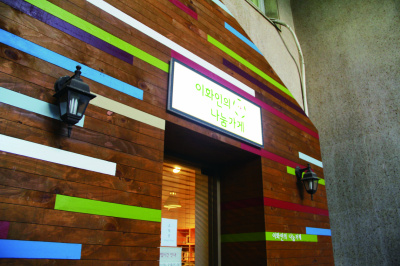Ewha Eco Shop spreads spirit of sharing throughout campus, Storystore: recognizing second-hand value through storytelling

Although it is widely thought that there is only one kind of charity shop in Korea, the aforementioned Beautiful Store, another that contributes more directly to the life of Ewha students is located on the ground floor of Morris Hall.
The Ewha Eco Shop, first opened on May 2011 in celebration of the 125th anniversary of Ewha, is well-known for its neat products and reasonable prices. The items are all donated by Ewha professors, graduates, students and staff members.
“We receive goods from various kinds of people related to Ewha, all who wish to benefit Ewha students,” said Bae Seul-lee, who is in charge of the Ewha Eco Shop. “Some of the items even include brand-name products and are in good conditions.”
Last year in Aug. 27, Ewha Eco Shop had earned a net profit of 116,392,280 won. All of the money had been returned to students and society in the form of scholarships and educational funds. Since its opening, the Ewha Eco Shop has continued to serve its function as a charity shop located inside the campus.
“All the volunteers in the Ewha Eco Shop are students or members of Ewha,” Bae said. “We really appreciate their hard effort and hope to receive more help in the future. Eventually the benefit will be returned to Ewha students.”
Students also express their gratitude toward the Ewha Eco Shop.
“There are a lot of products I find valuable in the Ewha Eco Shop,” said Chae Hyun-jung (Human Movement Studies, 4). “I was surprised to see so many cheap items of excellent quality. It is also very impressive to know that all the yields will go to Ewha students. I think it is a very good win-win measure since all the members of Ewha can earn something.”
Storystore: recognizing second-hand value through storytelling
When asked about the advantage of second-hand goods, most people think of the cheap and reasonable prices. It is uncommon for people to think of the product itself as a benefit. To reform this streotype toward second-hand items, Lee Sang-jin, a second-hand lover himself, organized a social enterprise named “Storystore” with his friends in 2012.
Storystore, as the name indicates, focuses on the story of second-hand goods. It receives second-hand clothes through Social Network Service from various people, and each of the items possess different kinds of stories.
“I remember a man who donated a winter coat, which seemed fairly expensive,” Lee said. “He gave that coat to his wife when both of them were young. At that time, he could not afford to give a costly gift to his then girlfriend. He worked hard at a construction site for a week and finally managed to buy the coat for her. Ten years later, his wife tried to throw away the coat, as she did not wear it anymore, but he stopped her and brought the coat to us.”
People donate their clothes to Storystore because all of them have special memories related to the items. Through donation, they hope that somebody else will cherish the item just like they did in the past. Some of them even go through reforming process by amateur designers, increasing the items’ uniqueness. Furthermore, Storystore plans to donate all of its yields to amputees, who often suffer from lack of clothes that fit them properly.
“Just cutting one side of a shirt’s sleeve is not enough for amputees,” Lee said. “They need certain kind of clothes that is made especially for them.”
Even though it is just a beginning, Storystore hopes to form a new kind of atmosphere toward second-hand goods in Korea. It plans to organize various events so that people could alter their awareness.
“Second-hand goods bear significant meanings in their stories and history,” Lee said. “It is true that the awareness toward second-hand is still underdeveloped, but I believe that through continuous effort, second-hand culture will blossom in Korea.”
Chung Che-yoon
thfl353@ewhain.net

